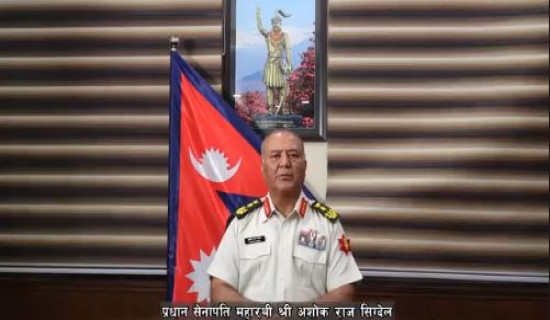- Saturday, 13 September 2025
CIAA intensifies anti-graft drive, files high-profile cases in last FY
BY SUSHMA MAHARJAN,Kathmandu, July 27: Nepal’s anti-graft watchdog, the Commission for the Investigation of Abuse of Authority (CIAA), significantly intensified its anti-corruption efforts in the fiscal year 2024/25, filing an unprecedented number of high-profile cases against former top government officials, including a former prime minister, former mayors, former chairmen, senior civil servants, and Nepal Telecom executives.
The scale and nature of the charges, many involving individuals who previously held some of the country’s most powerful positions, indicate what observers see as a more assertive stance in the CIAA’s approach to tackling corruption.
The most high-profile case came on June 5 when the CIAA filed chargesheets against former Prime Minister Madhav Kumar Nepal and 92 others over alleged irregularities in land transaction in Mahendrajyoti, Sanga of Kavrepalanchowk district.
The case centres on Patanjali Yogpeeth and Ayurveda Company Nepal’s (now renamed Patanjali Yogpeeth) purchase of land exceeding the legal ceiling set by the Land Act of 1964. The land was allegedly acquired at below-market rates and later sold for a higher profit, causing significant loss to the government. The anti-graft body has claimed Rs. 185.5 million from Nepal, holding him responsible for the damage.
The charges extend to several senior bureaucrats and ministers, including former Law Minister Prem Bahadur Singh, former Land Reform Minister Dambar Bahadur Shrestha, former Chief Secretary Madhav Prasad Ghimire, and former Land Reform Secretary Chhabiraj Pant.
This is the first time in Nepal’s history that a former prime minister has been named in a corruption case filed by the CIAA, a move many view as a turning point in the watchdog’s operations.
Another key focus of CIAA investigations has been irregularities in Nepal’s telecom and IT sectors. Former Nepal Telecom Managing Director Sunil Paudel faces corruption charges related to the company’s billing system upgrade, in which he allegedly embezzled USD 2.44 million (Rs. 334.9 million).
Paudel is also accused of separate financial irregularity amounting to Rs. 57.9 million during procurement of RISC and HCI servers in fiscal year 2018/19. He also faces two other cases: one involving financial embezzlement of Rs. 30 million in the procurement of security appliances and network equipment in the fiscal year 2017/18, and another concerning Rs. 158 million irregularities in the supply and installation of high-compute infrastructure in the fiscal year 2019/20. These cases reveal how technical sectors, often shielded by complexity and lack of oversight, can become hubs of corruption.
The CIAA also investigated cases involving religious trusts and the health sector, areas often perceived as less vulnerable to corruption. A case was filed against Dr. Milan Kumar Thapa, member secretary of the Pashupati Area Development Trust (PADT), and several PADT officials, accusing them of financial misconduct amounting to Rs. 103 million in the procurement of electric cremation machines. The CIAA reported that the price of a cremation machine was inflated to Rs. 15.2 million, up from an original estimate of Rs. 3.25 million.
Similarly, in the health sector, a case of financial loss of Rs. 524.25 million was filed against former secretary of the Madhes Province Social Development Minister, Im Narayan Shrestha, former director of the Provincial Public Health Laboratory, Janakpurdham, Dr. Shrawan Kumar Mishra, operator of Hospitech Enterprises Pvt. Ltd., Bishal Pandit. They were involved in the procurement scandal while purchasing laboratory equipment and necessary materials for the establishment of the Public Health Laboratory (Diagnosis Centre) at local levels of the province in fiscal years 2021/22 and 2022/23.
The CIAA also charged prominent political figures. Former Minister for Information and Communications Mohan Bahadur Basnet and Nepal Telecommunications Authority (NTA) former Chairmen Digamber Jha and Purushottam Khanal were charged with irregularities of Rs. 3.21 billion in the procurement and operation of the Telecommunication Traffic Monitoring and Fraud Control System (TERAMOCS).
Two separate cases were filed against Nagarjun Municipality Mayor Mohan Bahadur Basnet, accusing him of financial embezzlement of Rs 131.2 million in one case and Rs. 86.9 million in another as he used his position to gain illegal wealth.
Sudurpaschim Province’s former Chief Minister and Minister for Physical Infrastructure Dirgha Bahadur Sodari has also been charged with amassing illegal wealth worth Rs. 10 million while serving the public office. Additionally, Madhes Province former Minister for Economic Affairs and Planning, Bijay Kumar Yadav, and Bagmati Municipality former Mayor Bharat Kumar Thapa and Deputy Mayor Lila Kumari Moktan face allegations of embezzling over Rs. 567 million during the construction of fishponds in protected forest land in Ward Nos. 4 and 12 of Bagmati Municipality, Sarlahi.
Surge in complaints
CIAA statistics show a rise in corruption complaints this fiscal year. In fiscal year 2024/25, the CIAA received 28,597 complaints through various channels, along with 8,429 pending from the previous year, totalling 37,026 cases requiring action. Of these, 33.69 per cent were related to the federal government, 12.47 per cent to provincial governments, and 53.84 per cent to local levels.
The highest number of complaints were submitted via the CIAA website (10,245), followed by written applications (10,180), emails (8,488), postal services (5,555), and other platforms such as telephone, Viber, Facebook, mobile apps, newspapers, the National Vigilance Centre, and Hello Sarkar (2,558).
Through investigations, 80.22 per cent of cases were resolved, while 7,323 were carried over to the next fiscal year.
The CIAA filed 137 cases at the Special Court involving 753 defendants and sought recovery of Rs. 5.97 billion, including charges related to bribery, illegal gains, fake academic credentials, public property damage, unlawful asset accumulation, and money laundering.
Additionally, 22 sting operations led to the arrest of 33 individuals and the seizure of Rs. 5.51 million.
Strategic plan for the future
The CIAA has also published its Fifth Strategic Plan for the fiscal year (2024/25 – 2028/29). In its publication, CIAA Chief Commissioner Prem Kumar Rai said that the CIAA had prepared the plan to enhance its constitutional mandate of investigating and preventing corruption and abuse of authority.
According to Rai, the plan emphasises good governance, integrity in the public sector, and building public trust, with the ultimate goal of minimising corruption in the country. “The strategy focuses on curative, preventive, and promotional measures while strengthening the institutional capacity of the CIAA,” he said.
The five-year plan outlines four strategic pillars, 20 programmes, 75 activities, and 39 measurable targets. It also includes a clear implementation framework and risk management system to ensure effective results.
Rai expressed confidence that effective implementation of the plan would lead to significant progress in curbing corruption and enhancing public trust in governance.
Institutional capacity enhancement
The CIAA has also increased its outreach efforts in recent years. Over the past five years, it conducted 282 community school education programmes with the participation of 26,411 students and organised 502 provincial, district, and municipal-level interaction programmes attended by 50,164 public officials, employees, and stakeholders. It has established forensic labs, polygraph testing rooms, and statement recording facilities to strengthen investigations.
In addition, the CIAA has expanded the use of information technology, introduced a performance-based evaluation system, and extended its offices to all provinces.
These initiatives have helped improve efficiency, with the case resolution rate rising from 67.4 per cent in the fiscal year 2019/20 to 76.59 per cent in the fiscal year 2023/24.
Meanwhile, Nepal’s score in Transparency International’s Corruption Perception Index has seen slight improvement in the past decade, ranging from 29 to 34 out of 100, with its global ranking going up from 126th in 2014 to 107th in 2024.

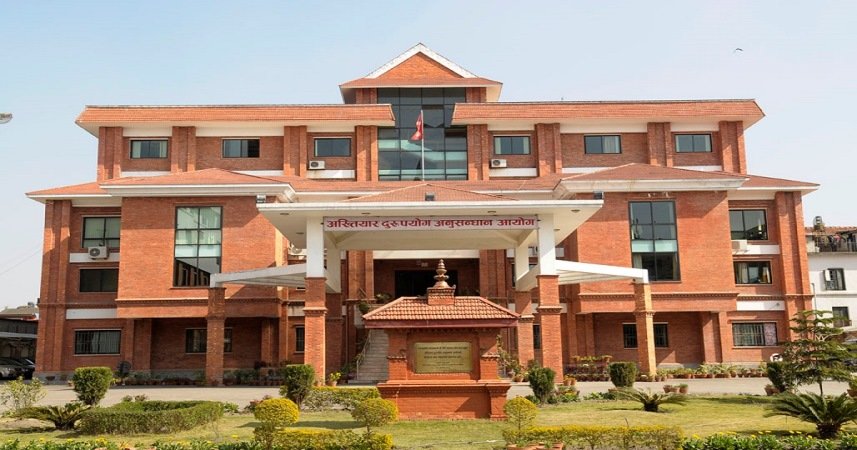

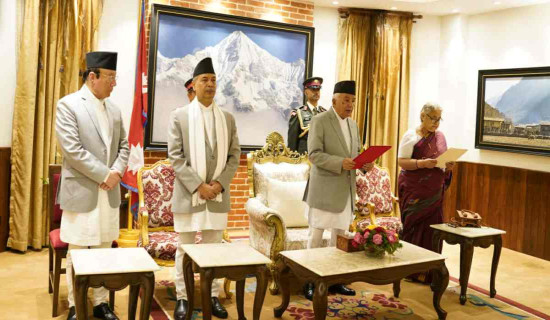
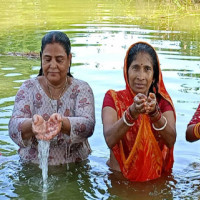
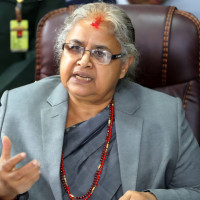


-square-thumb.jpg)

